Our first survey on the effect of COVID-19 on think tanks offers important insights into the concerns, challenges and opportunities that think tanks faced across the world. The following findings require further research. We intend to explore each, and other issues, in future surveys.
1. The sector will suffer setbacks
Most respondents predicted that there will definitely be setbacks. A little over 30% of respondents expected that only a handful will do well from the crisis. In fact, 9.5% said that this could involve some having to close down or significantly downsize their operations.
On the other hand, a little over 10% of the sample considered that this was either not a crisis for think tanks (4.3%) or that they would benefit as a consequence of the crisis (6.9%).
But how will this opinion evolve in the coming months? Especially when many experts have reported that funding cuts will only be felt in the second half of 2020 and early 2021 – and respondents agreed:
‘Funding has been cut until next year’
‘We expect to see the negative effects in 2021 when the donors completely shift their funds to COVID-19’
‘Our funding is largely based on donations from foundations which receive income from the stock market. If this income will be reduced, we might suffer from reduced funding next year.’
‘As a funder, we see pressure from our funders (governments and philanthropies), to redirect attention to COVID-19 related research immediately.’
‘There are likely to be fewer think tanks in the long run. I expect funding will fall sharply during the second half of the year.’
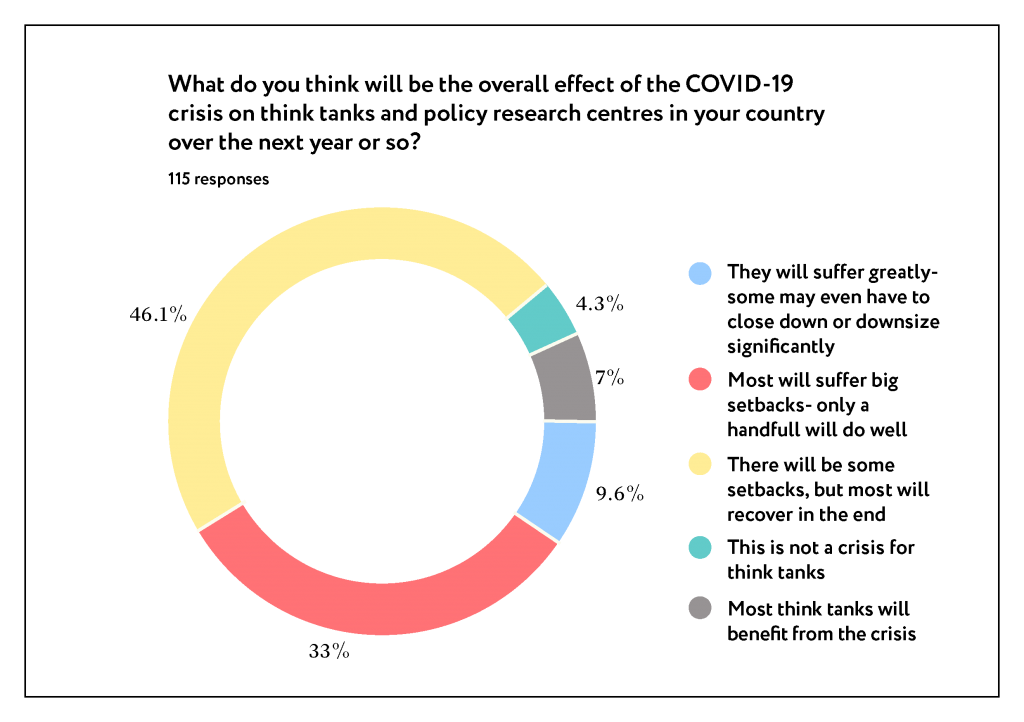
2. Thinktankers believe their think tanks are stronger than others
When asked about the effect on their own organisations, thinktankers have been more positive. Only 16.4% consider that they will be seriously affected by the crisis! 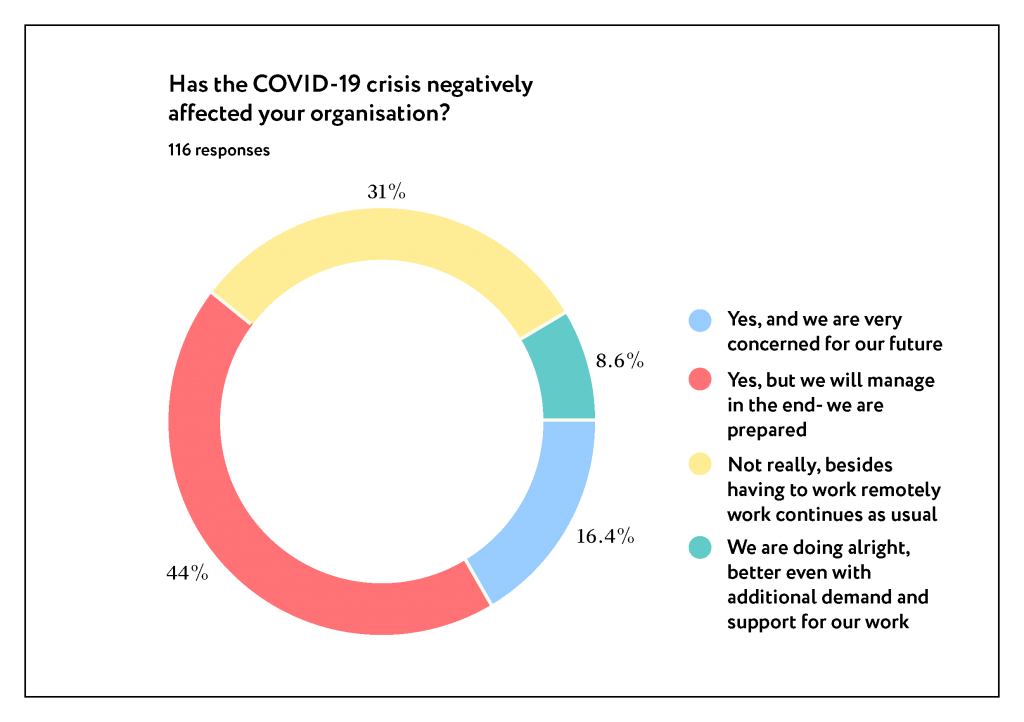
This should be a warning for funders interested in the effects that the crisis may have had on research communities where they operate. Asking their grantees only may not be enough.
3. Non-research staff are the most optimistic
While most respondents considered that the crisis will have negative effects on think tanks, 22% of communicators and 20% of other professionals saw it as either an opportunity, or a crisis that will not affect think tanks at all.
In fact, some communicators responded with a positive angle:
‘[The] positive: a modernisation push toward digitalisation, an enhanced understanding of more modern ways to do our advocacy and think tank work.’
‘Our webinars have been very successful and reaching new audiences so this has been a positive out of a very difficult situation.’
‘In rethinking in-person meetings, conferences etc. we’ve actually leaned into this and have reconceptualised how we are doing convenings and sharing information in ways that are positive and useful, instead of just rote moving in-person events to online platforms.
‘Our vision of virtual workspace has been materialised.’
‘I think the pandemic creates more opportunities for a young think tank to learn and grow.’
We wonder if the opportunities presented will materialise and if these positive experiences will find a way to change think tanks’ modus operandi in the medium to long term.
In future surveys we hope to find out more about how the views and advice of communicators and other professional services within think tanks shaped their organisations’ futures.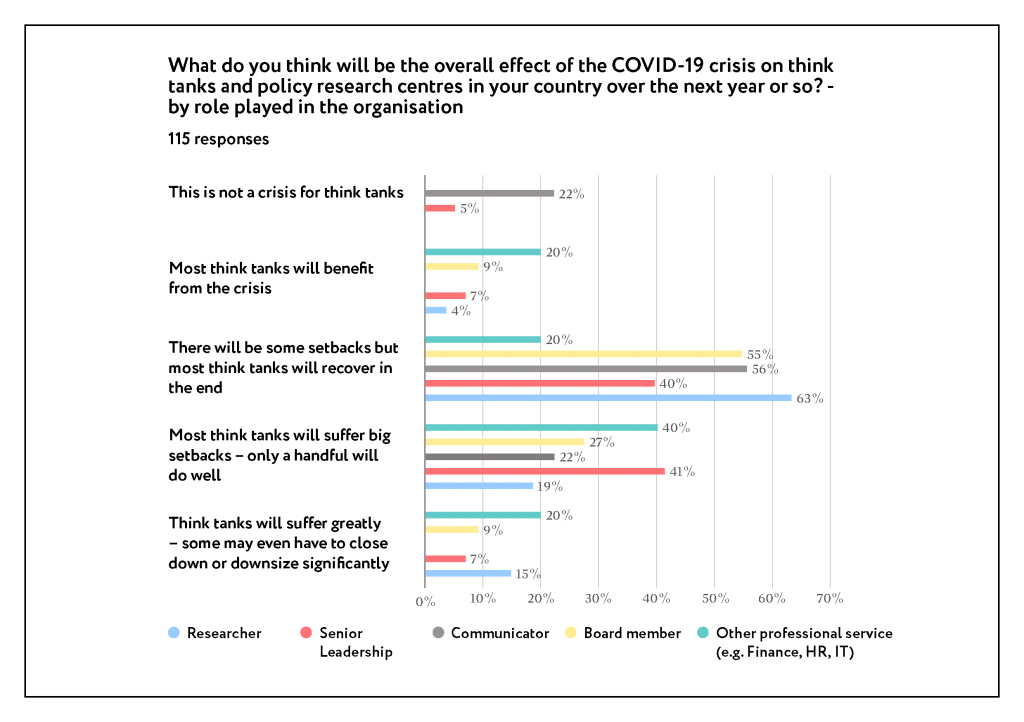
4. Think tanks in developing countries hold a gloomier outlook
The picture seems gloomier in the global South: 52% of Latin American thinktankers consider that the crisis will have a significant effect on think tanks in their country; 48% from Africa, 44% from Asia, 38% from Europe, and only 11% from the US and Canada thought the same.
This is possibly related to both availability of funding for think tanks and demand for their services in these regions. While the US, Canada and Europe enjoy a strong think tank funding sector (with both public and private funding available), most Asian, African and Latin American think tanks rely on either foreign or public funding.
In Latin America, foreign funding for think tanks has been in rapid decrease for at least the last decade and the crisis is surely reducing the availability of public funding. As a result, 13% of respondents from Africa and Asia and 16% from Latin America expect the crisis to lead to the closure or significant downsizing of think tanks.
In follow-up surveys, we expect to find European think tanks recovering from a crisis that will still be raging in the global South. How will this affect think tanks’ outlook? 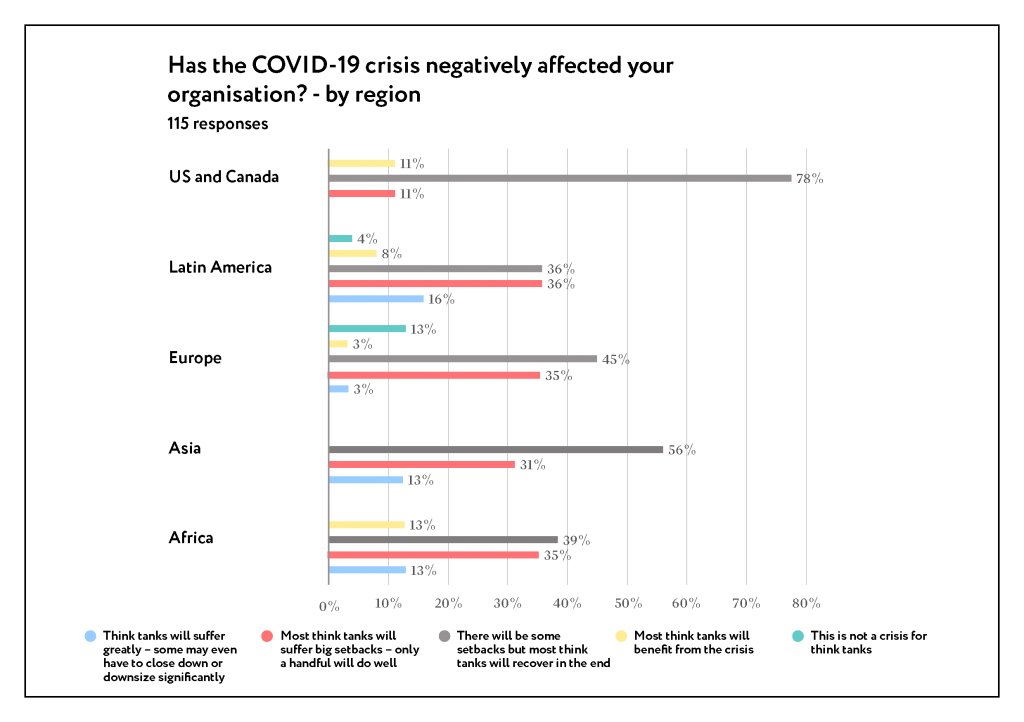
5. People, and then money, are thinktankers’ biggest future concerns
While 30% of those who are very worried about the future of their organisation have seen a decrease in funding, 49% have observed a negative impact on staff, including:
- staff being overwhelmed and stressed,
- a loss of productivity,
- difficulties implementing remote working and staff and family members becoming infected with COVID-19.
These are all connected. Stress and loss of productivity are certainly aided by the challenges involved in working remotely and health concerns.
Funding worries surely contribute to this level of stress. But so do changes in the political environment that have seen the civic space close in many contexts, policy agendas becoming monolithic, and research agendas that have taken years to develop losing all sense of purpose.
‘We were not ready for remote working since not all the staff has access to the Internet or to ITCs. It is very important to expand these services in this kind of crisis.’
‘Working remotely with our target beneficiaries has become a huge challenge. We work with rural populations where communication technologies either don’t exist or are a serious challenge. And because of total lockdown in the work areas, it becomes very difficult to reach our networks in these communities.’
How will this pan out as the crisis unfolds? Will a return to normal activities in Europe and North America help address staff welfare concerns? Will Latin America, the next pandemic epicentre, experience a worsening of conditions for think tank staff? 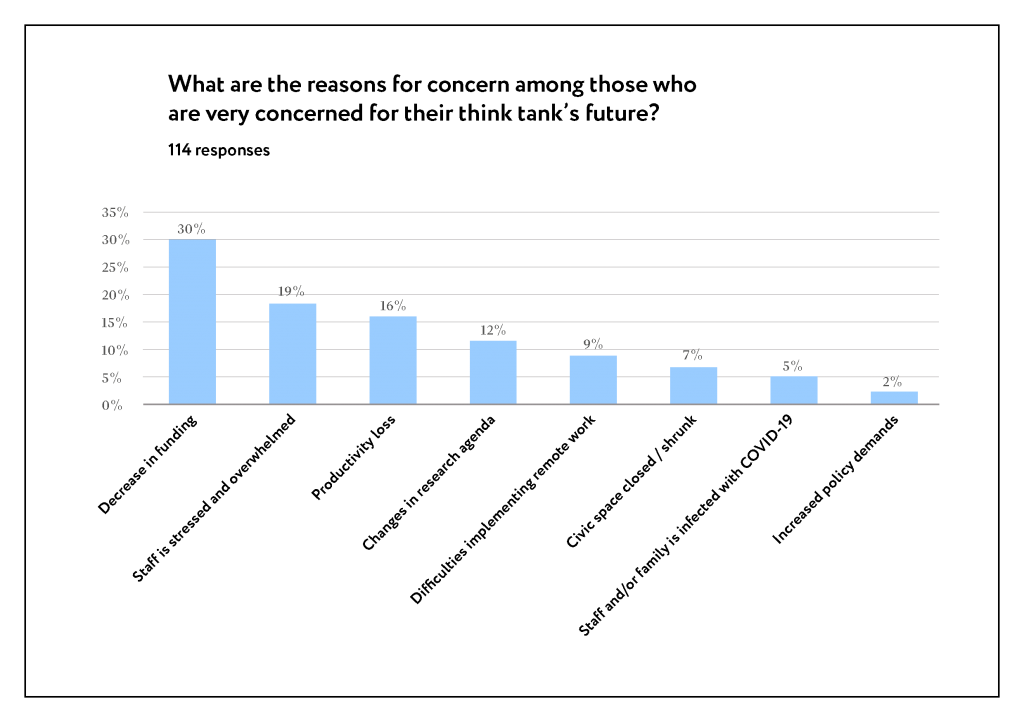
6. Think tanks have responded with a range of strategies
From sending staff home to re-assessing their research and communications plans, to contacting their funders and reaching out to their boards, think tanks are trying a range of strategies to deal with the crisis.
Only a few have taken the decision to lay-off staff. Many are expecting additional support from their usual funders or government stimulus packages to help them weather the storm in the coming months. 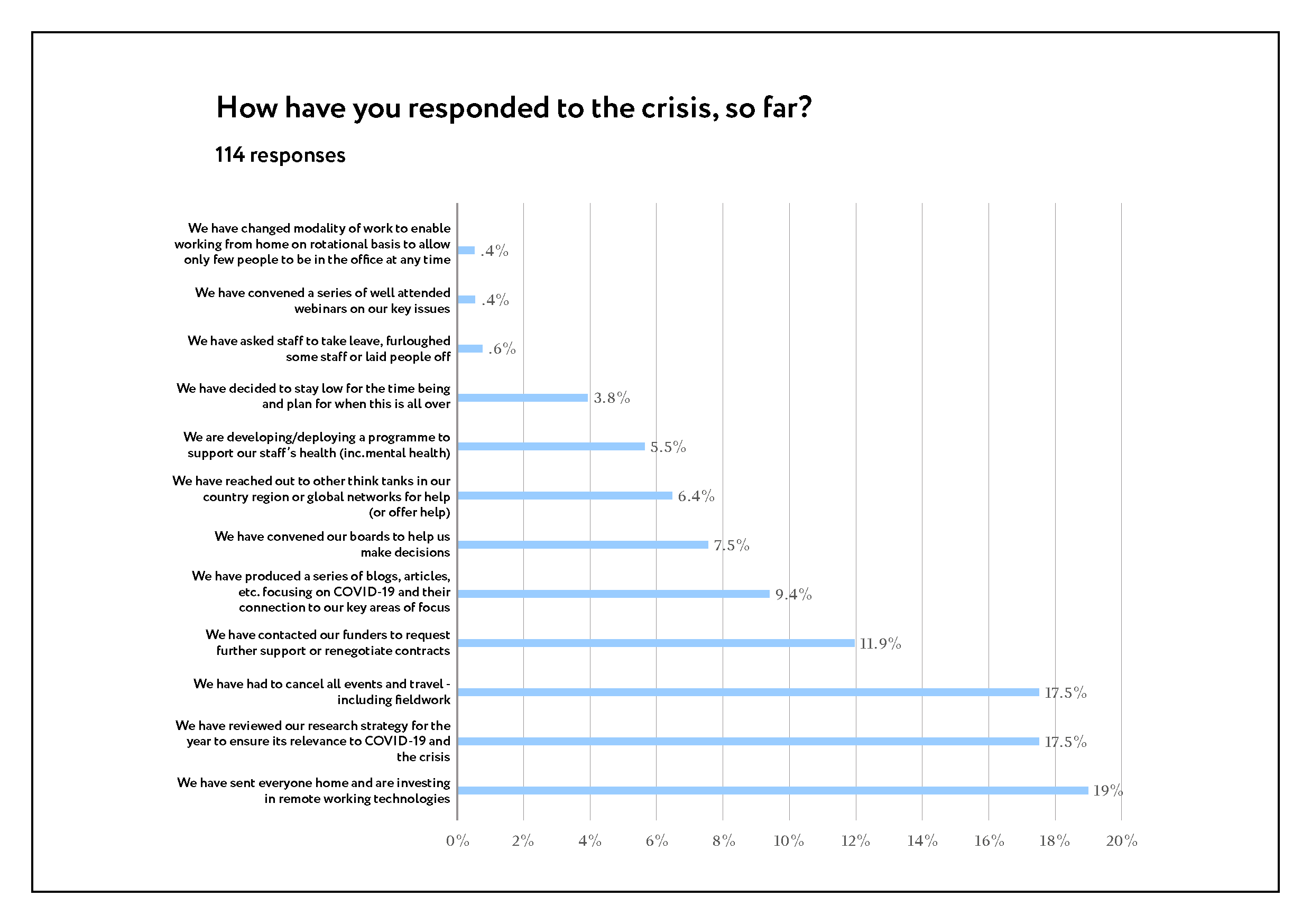 It will be interesting to explore the different effects that these strategies have on think tanks’ resilience.
It will be interesting to explore the different effects that these strategies have on think tanks’ resilience.
7. Governments have forgotten about think tanks
Only a small proportion of respondents, 4%, reported being included in their governments’ stimulus packages and policies – although this may have improved since the survey closed. Still, think tanks who expressed the most concern about their future were those who were not included in any direct or indirect support package.
In future surveys we hope to find out how many countries provided support to think tanks and policy research centres, and what kind of stimulus packages or policies worked best. 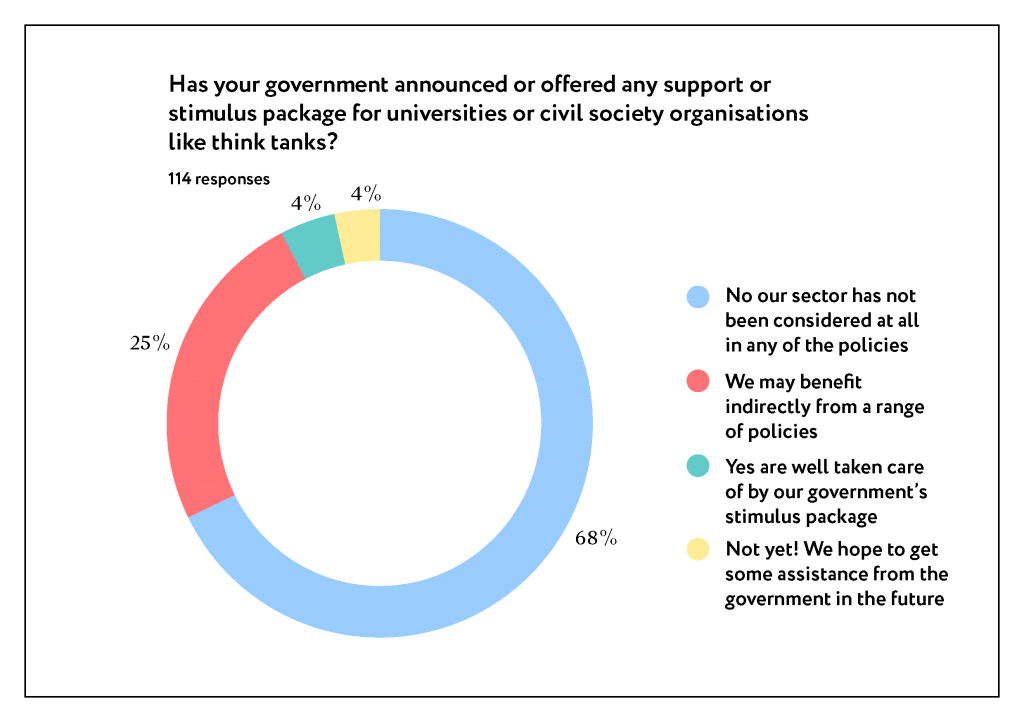
8. Think tanks need money but in a more nuanced way than we may think
Respondents made a strong plea for smarter funding for policy research. This includes funding practices that:
- are transparent and predictable,
- allow for flexibility,
- balance short- and long-term needs and possibilities,
- are conscious of the fact that think tanks are part of a wider policy research community, and
- includes ‘beyond the dollar’ support.
This is what they said:
‘[We need] clear regulations on how to handle surplus budgets in 2020 or even 2021.’
‘This is the period when flexible funding is needed as most project-based funding will require us to deliver on the planned activities as a condition for providing funding. Flexible funding that can be re-aligned to meet up with curtailing such distortions will be useful in this period.’
‘Financial support in the short term. Most donors have been thrown off their schedules for implementing, giving programmes and to some degree adjusting their targets, in light of COVID-19. Staff similarly need time to understand the implications of this episode [and adjust].’
‘We need long term support beyond the crisis. Even basic support so that we know that we can continue operating beyond the crisis.’
‘We have expenses and money saved to cover [salaries], but it’s going to be hard if this continues for six months. In terms of laying people off, we haven’t, but our contractors who usually work full time are working part time or not at all, which is 200 or so people.’
‘Institutional development support to strengthen virtual operations, virtual reach and engage experts in areas that have apparently become critical in this changed environment.’
‘A little more support for becoming more technologically equipped for working from home.’
‘More enhanced partnerships amongst think tanks and donors to facilitate continued engagement and shared knowledge, expertise and support.’
9. There are upsides!
Not all is doom and gloom. The crisis has offered thinktankers the opportunity to reflect on their business models, their strategies and the approaches they have followed in the past.
In some cases, they have been forced to try ways of working that had been rejected not so long ago; and many have been surprisingly pleased by the results.
‘We’ll probably innovate in some practices as a result of this.’
Others have used this crisis to usher in more substantial institutional reforms. The crisis has empowered their leaders or, often, the new generation of thinktankers, to bring about those changes. These include:
- restructuring the organisation,
- a realignment of research agendas,
- striking new partnerships with policy actors.
‘Upsides: Quick response, transfer to digital worked well, used our own resources more and managed to come up with new formats and even more publications. This has even brought bigger audiences. It’s also been easier to get ‘big names’ as they also work from home.’
‘The pandemic has resulted in positive restructuring of the organisation to be leaner and more effective.’
‘We are planning to transform ourselves into a virtual think tank.’
‘We have reviewed our annual work plan and realigned it with the current situation, in full concertation with our funders. We have developed a COVID-19 response programme focused on our strategic thematic areas, considering the short- and long-run impact of the pandemic. We have also developed a strategic partnership with key grassroots organisations, linked to our thematic focus areas.’
‘I believe that this will give our organisation better focus, aligning the things we do with the outcomes we want. We will have to do more with less – not only less overall productivity but less funding. But we also have a vast amount of flexibility now that our donors have unrestricted a large portion of our project-based grants. So, we have an opportunity to truly focus on quality and alignment of our work. We hope this will continue into 2021, if we can secure commitments from our donors to give with the notion of shared outcomes rather than an over-focus on line items and underfunding overhead.’
An unexpected upside of this is that for some organisations, these innovations and perceived improvements are having a positive effect on staff wellbeing – which has been so hard hit by the crisis.
‘We are getting heard, contributing in key public policies. This is boosting the team’s morale and zeal to work hard.’
There are upsides to the policy research contexts in which think tanks operate as well. The crisis has created opportunities for think tanks to win battles over the problems that their societies face. For once, policymakers and the general public are open to their analysis. Everyone can see that there are complex underlying problems and think tanks have the capacity to explain them and layout a path forward.
In fact, in Africa, Latin America and the US and Canada, there are thinktankers who consider that the crisis will not have a negative effect on think tanks, at all. On the contrary: the crisis will constitute an opportunity!
‘The crisis has revealed, in stark terms, some of the fractures and fragilities within various policy areas – especially health, education, economics – and some of the resiliency that emerges out of certain types of communities, especially religious communities. These are key areas of work for our think tank, and it’s provided opportunities for our message to be heard in new ways.’
‘It somehow makes our work more relevant, more pressing, more urgent.’
‘The opportunity to rethink our role and future radically. The solutions and policies we promote (including universal basic income) are receiving focus and support as never before.’
This is further supported by a revaluation of the role of experts in many countries. Overnight, they have overcome, even if temporarily, years of blows to their legitimacy.
‘The role of experts will be revalued.’
‘I see a silver-lining in this period as [our think tank] will likely become more relevant in the knowledge debate on the impact of the COVID-19 outbreak.’
‘Knowledge and research now will be more demanded than before. This opens doors and possibilities for research institutions.’
‘COVID-19 will further emphasise the critical issue of investing in science, technology and innovation capabilities of nations – to our advantage.’
This is having a positive impact on the think tank community, too. It is bringing teams together and fosters collaboration between organisations like never before.
‘It has brought our community closer together and made me proud to work for [my organisation].’
In future surveys it will be important to determine how many think tanks have been able to take advantage of the opportunities presented and why. We will also want to learn more about how national think tank communities have changed as a consequence – are they more or less equitable?
10. It’s not over yet
The crisis is a test of fire for many organisations. Their entire business models will be stretched to the limit.
‘The crisis showed which think tanks are capable to quickly react to an unforeseen development by producing high quality analyses and convening high quality meetings, and which have opted for quantity over quality. I think that this may lead some think tanks to lose their public due to low quality outputs and others gaining it.’
There are significant challenges ahead. Funding may still drop dramatically in the second half of the year and in 2021.
‘Loss in funding likely for 2021.’
‘A massive recession will tighten funding considerably in the medium term.’
For many, a prolonged period of uncertainty may lead to a loss of staff – the most vulnerable to income shocks, women, young people and thinktankers from lower socio-economic backgrounds may have to leave the industry altogether – thus making think tanks less diverse and inclusive organisations.
In a few countries the civic space has closed even further. With few independent funding sources available, think tanks are dependent on government funding and are feeling the pressure from the government to help legitimise their policies. This could erode think tanks credibility in the long term – even if they survive.
‘There is much less space for disagreement with government policies, especially regarding some aspects of the lockdown.’
In the long run, they may be alone in a world with fewer democratic institutions, a larger and opaquer state and a less open social contract.
‘The important challenge will be significant reduction in funding for democracy and accountability projects. Our current donors are already redesigning their programmes and focus. And depending on how long the pandemic lasts, there will be breakdown in work infrastructure. This will surely have an impact on our work.’
How can OTT help them?
We asked how OTT could be of assistance during this crisis and in the future. The responses varied but more or less aligned with our areas of work.
Think tanks want help amplifying their voices. They have been working hard, from the early days of the pandemic, to study and find solutions to the highly complex problems affecting their societies. But not all their voices are being heard – and this is certainly the case among think tanks in the global South, and for the smaller and less well-connected think tanks.
‘Visibility.’
Visibility will help think tanks to contribute to national, regional and global debates and to raise necessary funding.
‘By linking us to potential researcher funders who are willing to invest in strengthening research ecosystems in the region amidst this crisis.’
Greater visibility of the challenges they face is also important. Think tanks want help communicating to funders the kind of support that they need and the importance of supporting think tanks’ long-term strategies. We may be able to do this ourselves or create spaces for think tanks to work together on their common agendas.
‘To highlight the fact that think tanks are vulnerable especially because of the dearth of core funding that provides flexibility.’
‘Advocate for flexibility and flexible funding modalities from funders; advocate against “Covidisation” of everything. There are still important issues in the world to deal with now and in the post-COVID-19 world.’
‘Giving spaces to talk about what we are doing or have been doing in relevant topics such as social protection.’
They also want us to help convene spaces for, and to facilitate, learning – from the OTT team, global experts, and each other.
‘Necesitamos aprender de la experiencia de otros think tanks (we need to learn from the experience of other think tanks)’
‘Create virtual communication spaces with other think tanks, where we can share and listen to experiences.’
‘OTT’s sharing of best practices has always been welcome.’
The issues that think tanks want to learn about are diverse:
‘Hearing from, and learning from think tanks around the world about how they are coping with the financial challenges, as well as hearing about innovative ways think tanks are deepening relationships in the midst of physical distancing would be even more welcome now.’
‘Webinar training on communications and outreach skills in this new context would be very helpful.’
‘Guiding us on how to use technology to innovate in raising funds based on our knowledge and research findings and to identify the right tools.’
‘Help to develop a programme to prepare staff to [respond to] this crisis (how to manage work combined with other concerns).’
‘It would be great if we could learn from the experience and mitigation measures of similar think tanks and advocacy groups.’
‘By sharing information on what coping mechanisms think tanks are implementing to deal with this crisis globally.’
Fundraising capacity also features among the requests for support:
‘It would be so useful to crowdsource knowledge on how others are rethinking their operations and fundraising models.’
Finally, there is a clear demand for help in nurturing a global community of think tanks and their supporters. This is one of the most consistent messages since the crisis started in early 2020. Think tanks want and are willing to reach out to each other for help and with support.
OTT has tried, and will continue, to work hard to strengthen local, regional and global communities. We do this by inviting contributors to our blog, convening online and face to face networking events, actively making connections between think tanks and carefully generating data, evidence and insights about think tanks across the world.
‘Acting as a convenor and providing space for discussions on common problems and facilitating exchange, building the sense of community for think tanks’
‘Maybe OTT can help in finding new partnerships all over the world.’
‘Continue to connect think tanks globally and regionally to promote a sense of community in face of this struggle. And so, well done!’
But there is also a reminder to all of us. We must also:
‘Bring new ideas for the future.’

